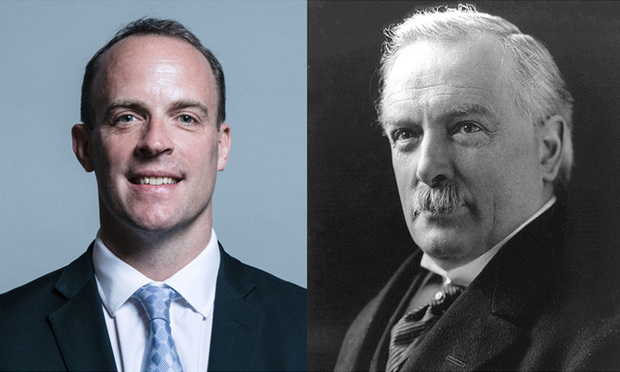The Parallels of the Only Two Solicitors To Have Run the UK
In challenging circumstances Dominic Raab has been thrust into a role that has been held by only one solicitor before him: David Lloyd George.
April 07, 2020 at 08:36 AM
5 minute read
 Dominic Raab and David Lloyd George (Image: Wikimedia Commons)
Dominic Raab and David Lloyd George (Image: Wikimedia Commons)
Law-makers and lawyers have always had an obvious, tangible relationship. From Tony Blair to Clement Attlee, not to mention Margaret Thatcher, many who have passed through the sector have gone on to take the highest seats in government.
And yet, for the best part of two centuries, solicitors have always played second fiddle to their barrister compatriots when it comes to holding the greatest office of state.
However, in the most challenging of circumstances, Dominic Raab has been thrust into the spotlight. And in doing so, he has done what just one solicitor has done before him – led the country.
Dire as the circumstances are, the move by Boris Johnson last night to pass de facto control of governing the country to the Foreign Secretary marked the first time a qualified solicitor has led the country since David Lloyd George in 1916.
Whilst Raab is less than 24 hours into his deputising role, there are interesting parallels between him and Lloyd George. Both trained at an early age in law, both rose through political ranks with rapid speed and both took on the mantle of leadership at a time of crisis.
And Lloyd George was actually prime minister during the last pandemic to hit Europe – the Spanish Flu of 1918. Similar to Johnson, Lloyd George contracted the illness whilst in Manchester and was forced to spend days in a makeshift sick bed in Manchester town hall and required a respirator to help with his breathing difficulties. He did, however, pull through.
Manchester-born but of Welsh origin, Lloyd George spent most of his childhood in Pembrokeshire and his mother's naitve Caernarfonshire. According to John Grigg's biography of young Lloyd George, it was here aged just 16 Lloyd George was articled to a junior partner at the Welsh solicitors: Breese, Jones and Casson.
He also went on to practice with his brother William George in a practice known as "Lloyd George & George", even continuing to practice whilst an MP – if city directory records are anything to go by.
His interest in politics and involvement in the Liberal party brought him into the echelons of politics – first as an MP in 1890 before soon rising the ranks to Chancellor in 1908 before coming Minister of Munitions in 1915 soon after the outbreak of the First World War.
It was the untimely and tragic death of Lord Kitchener in a mine explosion that propelled Lloyd George to the role of Secretary of State for War in 1916, and then less than six months later to the top posittion of Prime Minister as part of a War Cabinet in perhaps the bleakest period of the war.
But while Lloyd George stayed close to his legal roots, Dominic Raab's relationship with law was perhaps more fleeting. After earning at Masters at Cambridge, Raab entered law as a trainee at Magic Circle firm Linklaters, then Linklaters & Alliance, in the late 90s.
Raab qualified in 2000, but left the firm shortly afterwards to pursue a career in the Foreign Office as an adviser, mainly of legal briefs. He became an MP in 2010 before rising quickly under Theresa May – eventually becoming Secretary of State for Exiting the European Union, and, following a failed leadership bid, Foreign Secretary under Boris Johnson at the age of just 46.
The latter's poor health condition has now propelled Raab further to control day-to-day government affairs.
Crisis can make great leaders, and if history is anything to go by, the steady hands of a lawyer can be a useful tool in troubled times.
Other lawyers who made it to the top
Tony Blair
Prior to leading the country for a decade, Tony Blair was a member of Lincoln's Inn and also a founder member of the Chambers, 11 King's Bench Walk under Lord Irvine QC, where he met his wife Cherie Blair.
Clement Attlee
Attlee originally trained as a barrister at the Inner Temple and was later called to the bar in 1906 aged 23. He worked at his father's law firm Druces and Attlee according to Frances Beckett's bioegraphy, Clem Attlee.
Margaret Thatcher
Despite originally studying Chemistry and taking her first job as a chemist, Thatcher later trained as a barrister and was a pupil at Red Lion Chambers going on to specialise in tax.
Spencer Percival
Perhaps most famous for being the only British prime minister to have ever been assassinated, Percival enjoyed a successful legal career prior to politics – studing at Lincoln's Inn before going on to hold a number of positions including deputy recorder and commissior of bankruptices, according to his biography in R.G. Thorne's The History of Parliament.
Herbert Henry Asquith
Another Lincoln's Inn alumnus, Lloyd George's prime ministerial predecessor Asquith was called to the bar in 1876, and enjoyed a successful career as a barrister after joining Inner Temple Chambers seven years later.
This content has been archived. It is available through our partners, LexisNexis® and Bloomberg Law.
To view this content, please continue to their sites.
Not a Lexis Subscriber?
Subscribe Now
Not a Bloomberg Law Subscriber?
Subscribe Now
NOT FOR REPRINT
© 2025 ALM Global, LLC, All Rights Reserved. Request academic re-use from www.copyright.com. All other uses, submit a request to [email protected]. For more information visit Asset & Logo Licensing.
You Might Like
View All
The Quiet Revolution: Private Equity’s Calculated Push Into Law Firms
5 minute read

Law Firms Mentioned
Trending Stories
- 1South Florida Attorney Charged With Aggravated Battery After Incident in Prime Rib Line
- 2'A Death Sentence for TikTok'?: Litigators and Experts Weigh Impact of Potential Ban on Creators and Data Privacy
- 3Bribery Case Against Former Lt. Gov. Brian Benjamin Is Dropped
- 4‘Extremely Disturbing’: AI Firms Face Class Action by ‘Taskers’ Exposed to Traumatic Content
- 5State Appeals Court Revives BraunHagey Lawsuit Alleging $4.2M Unlawful Wire to China
Who Got The Work
J. Brugh Lower of Gibbons has entered an appearance for industrial equipment supplier Devco Corporation in a pending trademark infringement lawsuit. The suit, accusing the defendant of selling knock-off Graco products, was filed Dec. 18 in New Jersey District Court by Rivkin Radler on behalf of Graco Inc. and Graco Minnesota. The case, assigned to U.S. District Judge Zahid N. Quraishi, is 3:24-cv-11294, Graco Inc. et al v. Devco Corporation.
Who Got The Work
Rebecca Maller-Stein and Kent A. Yalowitz of Arnold & Porter Kaye Scholer have entered their appearances for Hanaco Venture Capital and its executives, Lior Prosor and David Frankel, in a pending securities lawsuit. The action, filed on Dec. 24 in New York Southern District Court by Zell, Aron & Co. on behalf of Goldeneye Advisors, accuses the defendants of negligently and fraudulently managing the plaintiff's $1 million investment. The case, assigned to U.S. District Judge Vernon S. Broderick, is 1:24-cv-09918, Goldeneye Advisors, LLC v. Hanaco Venture Capital, Ltd. et al.
Who Got The Work
Attorneys from A&O Shearman has stepped in as defense counsel for Toronto-Dominion Bank and other defendants in a pending securities class action. The suit, filed Dec. 11 in New York Southern District Court by Bleichmar Fonti & Auld, accuses the defendants of concealing the bank's 'pervasive' deficiencies in regards to its compliance with the Bank Secrecy Act and the quality of its anti-money laundering controls. The case, assigned to U.S. District Judge Arun Subramanian, is 1:24-cv-09445, Gonzalez v. The Toronto-Dominion Bank et al.
Who Got The Work
Crown Castle International, a Pennsylvania company providing shared communications infrastructure, has turned to Luke D. Wolf of Gordon Rees Scully Mansukhani to fend off a pending breach-of-contract lawsuit. The court action, filed Nov. 25 in Michigan Eastern District Court by Hooper Hathaway PC on behalf of The Town Residences LLC, accuses Crown Castle of failing to transfer approximately $30,000 in utility payments from T-Mobile in breach of a roof-top lease and assignment agreement. The case, assigned to U.S. District Judge Susan K. Declercq, is 2:24-cv-13131, The Town Residences LLC v. T-Mobile US, Inc. et al.
Who Got The Work
Wilfred P. Coronato and Daniel M. Schwartz of McCarter & English have stepped in as defense counsel to Electrolux Home Products Inc. in a pending product liability lawsuit. The court action, filed Nov. 26 in New York Eastern District Court by Poulos Lopiccolo PC and Nagel Rice LLP on behalf of David Stern, alleges that the defendant's refrigerators’ drawers and shelving repeatedly break and fall apart within months after purchase. The case, assigned to U.S. District Judge Joan M. Azrack, is 2:24-cv-08204, Stern v. Electrolux Home Products, Inc.
Featured Firms
Law Offices of Gary Martin Hays & Associates, P.C.
(470) 294-1674
Law Offices of Mark E. Salomone
(857) 444-6468
Smith & Hassler
(713) 739-1250









